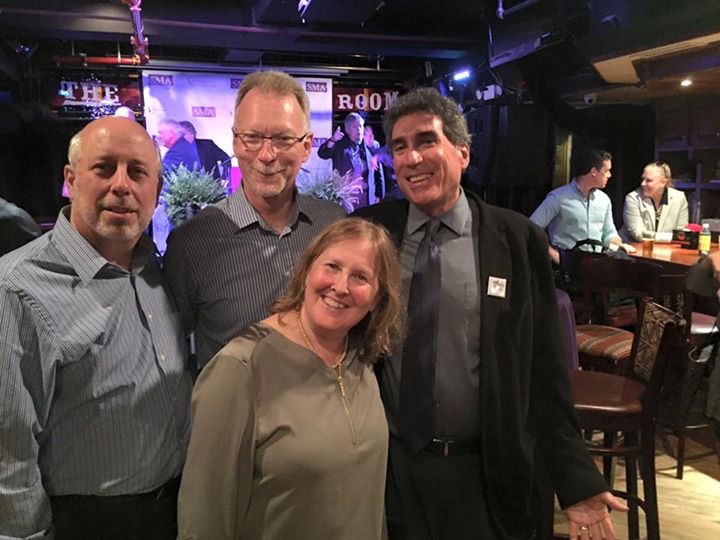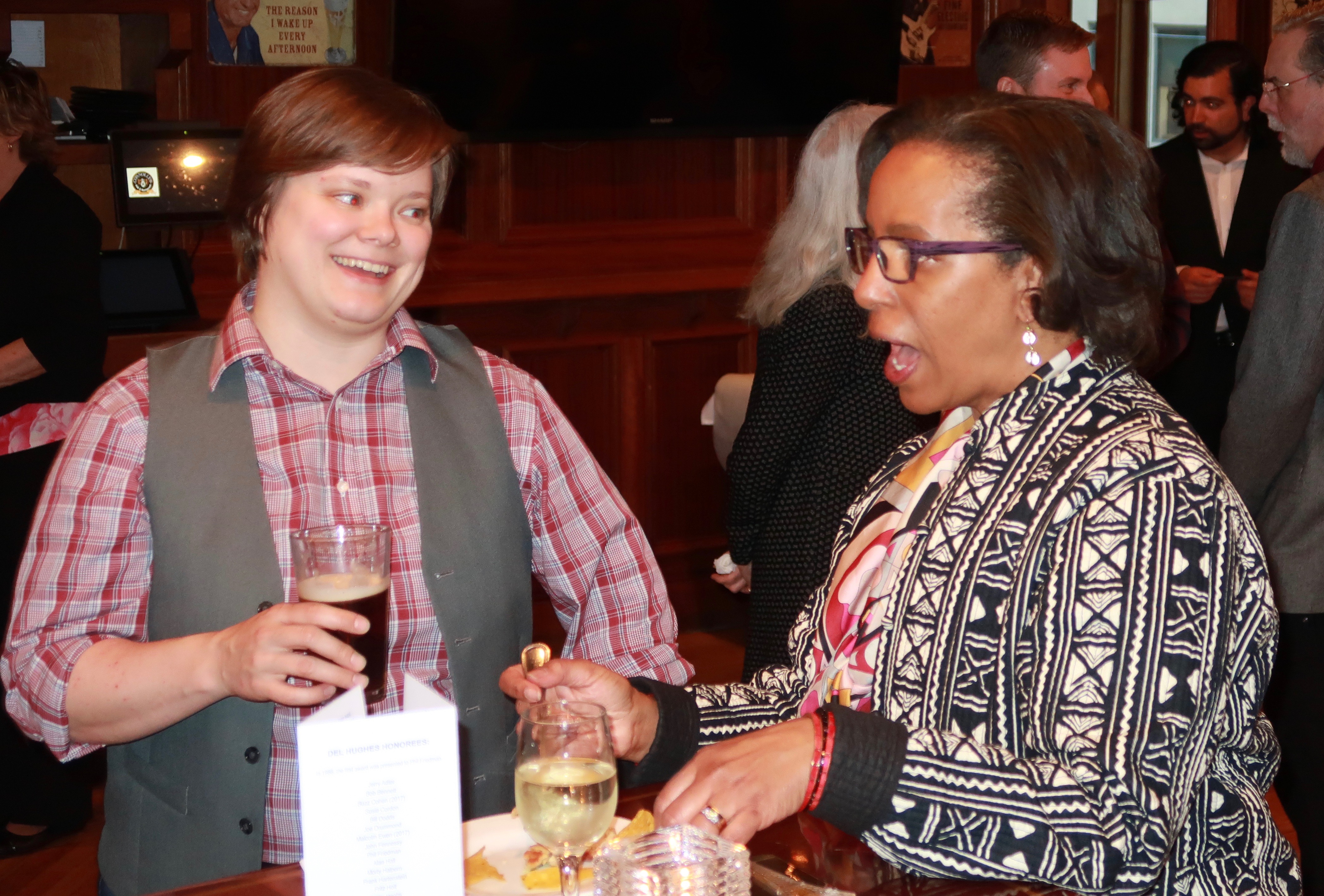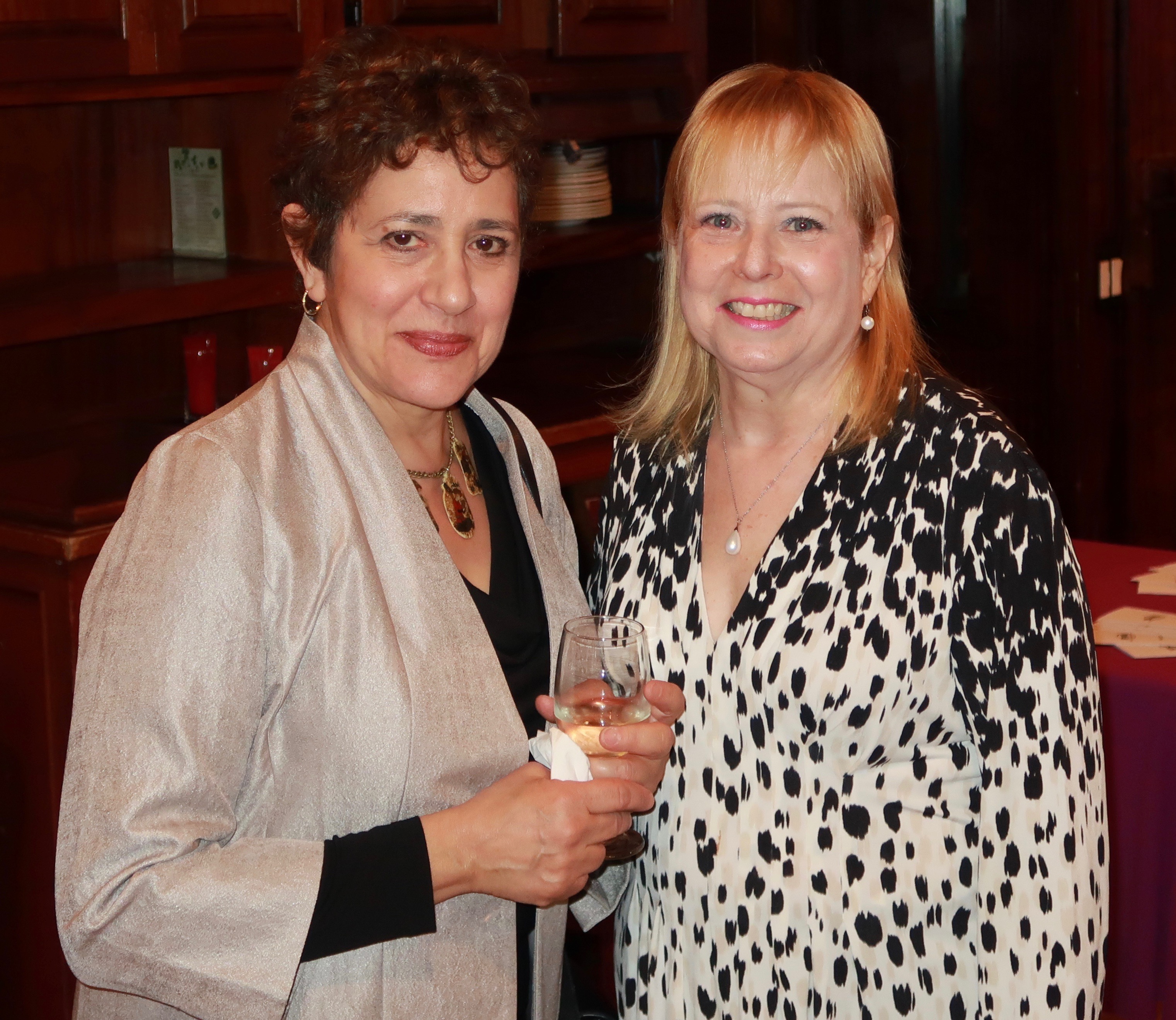Founders’ Reminiscences
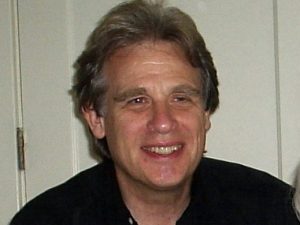
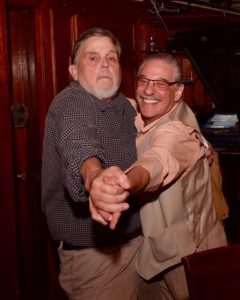
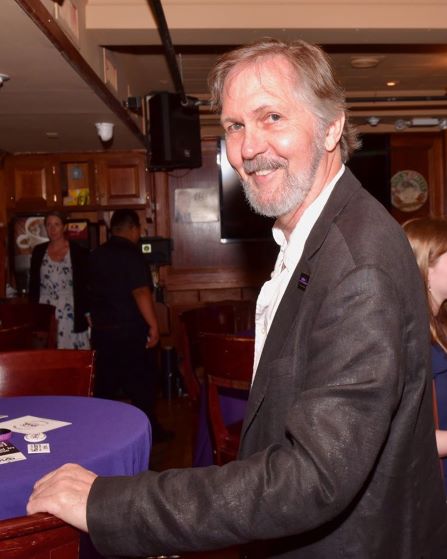
In its formative months the “Founders” of the SMA had significant differences of opinion as to what it was they were founding. Two main factions emerged, though there was little unanimity of opinion within each. One group, led by the more established Broadway PSM’s, wanted the organization to be mainly a social club. They were comfortable being a part of AEA and wanted no talk of separation from the Union. When the name of the group was being discussed they suggested, “Stage Manager‘s Club,“ “A Bunch of Stage Managers,“ and “Stage Managers Drink Night.” Some asked, “Why do we even need a name?”
The other group, to which I adhered, had issues with AEA. We had listened to both Principal and Chorus activists complain that stage managers minimums were higher than actors. Some, we were told, sought to “correct” this unfairness in future negotiations. We knew that on Broadway most musical directors and head carpenters were making nearly twice Broadway PSM minimums. Were our responsibilities so much less? Or was it that they had stronger unions? The power at AEA was with Council and we had scant influence there. We were the stubby tail of AEA and thought we’d never begin to get that dog’s attention, let alone wag it.
Outspoken pressure from this latter group led to the formation of a Committee to explore other labor unions as potential options for stage managers. The former group countered, effectively hamstringing the Committee, by passing an amendment that limited the Committee’s mandate. It could not speak directly or approach in any way any existing labor union. It was merely to research other unions’ history and bylaws from public records and report back to the membership. Which it did. And which, of course, led nowhere. The movement to organize a separate union or have stage managers join IATSE, SSD&C or any another union other than AEA was abandoned. An ancillary benefit accrued, however. When word that stage managers were discussing leaving Equity reached the Union‘s leadership, attention of a kind was finally paid and Council representation for stage mangers was formalized.
As for the SMA, it turned out to be neither a drinking club nor a Union but the professional society that it has remained.
In those early meetings, I served as parliamentarian as the group discussed and voted on the creation of the Constitution and Bylaws. In theory, Roberts Rules of Order, with which I had considerable acquaintance, is designed to allow a group to make decisions based on the opinion of the majority, but respecting the rights of the minority. De facto, those familiar with its bells and whistles can (and I must admit – did) unfairly manipulate voting and other procedural matters. This caused frustration among some, anger in others. A simplified version of Roberts Rules was eventually adopted, and the Constitution managed to get written. Today’s quiz: which takes precedence, a point of order or a point of personal privilege?
I was in attendance at several meetings before the big one to add a Stage Manager to Council. I had been subbing on Dancin’ and had seen the notice on the call board. I recall squeezing into some restaurant and sitting near Robert Cohen, during lively discussions of whether to adopt the Robert’s Rules of Order. (Maybe I thought they were your rules.) I was a young stage manager who had only recently moved to NY and was trying to meet as many people that could help me further my career. I’m sure I was pretty quiet and just watched and listened as the venerable SMs debated all the various ins and outs of how we were to organize the SMA. And, I proudly went to the Booth Theatre to cast my vote.
My recollections are a swirl of smoke-filled restaurants; the massive amounts of investigative paperwork we gathered that explored the possibility for stage managers to join other unions; the urgency to gain stage management representation on the AEA Council; the exultation we all felt at the Booth Theatre when the vote was tallied; the germinating meeting for the Headset/Newsletters on Peter Lawrence’s upper West Side deck; full membership meetings every three to four weeks; the snip, cut, and paste Constitution meetings, and the knowledge that we found strength in numbers that served notice to the theater community that stage managers now stood proudly recognized as a body of professionals in the theater community. We found strength and unity in numbers that persists till this very day. I look back on those many SMA stage managers that have assisted me through the years, and have succeeded in their own careers beyond my wildest dreams. The process of mentoring stage managers through the SMA has enriched my own career in so many untold ways. We all learned from one another, and continue to inspire one another to great achievements.
Another proud moment in SMA history was when I was able to pave the way for a stage management ombudsman within AEA. Not only did we have representation on Council, we now had the ear of the salaried staff of AEA. It is a system that has worked so successfully, that now there is such a person in Chicago, LA, and New York to address stage managers’ concerns, in order to provide better working conditions for all AEA members.
25-years ago I oft heard the word “venerable” applied to the many elder statesmen in attendance at those early meetings. Goodness knows I just passed a mirror, and the reflected image called out to me, “Venerable.” Psst, did anyone tell anyone in this room our work is not completed? We are still here, inspiring, mentoring, and passing the torch to some of the most wonderful people that I have the privilege of spending my working life with: stage managers.
My early SMA memories have revolved around 2-areas: *strength in numbers & *power in self-reliance.
It was incredible to think that 25-years ago, the theatre community only saw stage managers as isolated individuals. We had been one per show, or maybe newly hired by a mentor– that’s certainly all I knew. In school, too there were always lots of directors, designers, actors– and so few WILLINGLY chosen stage managers. Luckily I’d just married a fabulous stage manager–for me a great personal choice! Coming into a professional community of other stage managers, everyone seemed to just feel the strength in our numbers.
While flocking to meetings in smoky theatre district places, or joining a late drink-night, SMA members also shared community-building traditions: a shared passion, and powerful self-reliance. In the SMA the talk would sometimes grow heated. Outrage over Equity actions was fiery. Working together rather just talking was empowering! This spread to the way we built the organization, too. In order to get things done, we brought it up, talked it out & did it! We did not act alone. Others would also step in, form a committee, and get the task done! I remember the needs around getting nominations for officers. Though I knew I could not serve in an officer-capacity that next year, of course I could serve as part of a nominating committee. We’d put our contact information out to all, worked together to canvas folks to run for offices, created the paperwork & did it! And, in the end we came up with a fantastic first slate of officers.
Though the meeting places are no longer smoke-filled and my professional work has taken me in other directions, the feelings remain strong. Now 25-years later, it’s almost incredulous to celebrate both being happily married to the same guy, and I still believe in the power of like-minded people who support one another.
Here’s to many more celebrations!
Fond memories:
Drink night! How I looked forward to going to that small crowded back room in some bar on 8th Avenue. We all hopped from table to table, hearing what was going on back stage in other theatres.
Drink nights were fun, but it wasn’t just drinking. It brought forth the idea of our having our own organization, which would look after our concerns and future. Meetings in the afternoon followed where we planned our strategy.
We knew there was to be an annual Equity meeting at the Booth Theatre at which the proposed amendment for a stage manager to be on the Council would take place. Consequently, we called every stage manager we knew and asked them to be present. What an exciting moment it was when the amendment came up for a vote and all the stage managers in town stood up. Everyone, except us, was in shock. Needless to say the amendment passed.
To me, 25 years ago was the golden age of theatre. It wasn’t computerized; the electricians did all the cues manually, the fly men took care of all the drops flying in and out, the carpenters often pushed units in place. Maybe it was simplistic, but it was so satisfying and fun when the shows were flawless.
Twenty five years ago marks the beginning of a better world when stage managers began being recognized for hard work and devotion. Thanks to the Stage Managers’ Association.
I remember Barry [Kearsley, my late husband and one of the founders] and I hosting newsletter editing parties and newsletter mailing parties. Those sessions were so much fun. We’d argue over every comma, but we’d eventually get it written. We ran the whole operation out of our apartment for the first two and a half years! We had to tip the mailman generously for dealing with all the mail we received – mostly applications from new members. At one point, I was Chair and Allison Sommers was Secretary – Allison lived in the next block on 14th Street and we would run back and forth late at night with updates or finished newsletters. This was all before computers, so we’d type everything on our electric typewriter. Those were the days!
In the Spring of 1980 I was working with Jane Neufeld and Bob LoBianco on a French import at the ANTA (now the Virginia) Theatre. Jane talked about how unfortunate it was that stage managers worked in such isolation from one another. As had been her wont, she called some friends for a between-shows-on-Saturday lunch. This time though, she called more than usual. We were an imposing presence of maybe twenty or so stage managers at one large table at the old Italian restaurant across from the ANTA. At one point, lighting designer Ken Billington walked in, registered his surprise, and with what seemed like a forced smile, asked what was going on with all of us. Receiving an answer of no import, he wandered off. Lunch ended with all of us declaring the fun we had had, and that we should definitely do this more often.
The phone calls started late Monday morning. By late Monday afternoon many of us had received calls from an array of Producers and General Managers all wanting to know what that stage managers’ meeting had been about. It seemed that Jane’s idea had inadvertently struck a nerve. Momentum began to gather until we ultimately formalized in ’82, but I still think of that sunny March afternoon in 1980 as the Ur meeting of SMA.
My memories of the founding days of the SMA are bittersweet. So many dear friends, now gone. As we all sat around trying to define the objectives and sort out the rules of order, we were actually using the gatherings to keep track of who was newly diagnosed. When called to order, we all worked thru the new business/old business, but the moment we broke it was who could stop by St. Lukes and who could drop off a meal – but that was for the few who stayed around. Mostly they just disappeared, not wanting to suffer in public. No, I do not miss those days at all and I am so happy to see each and everyone of you tonight.
I’m in L.A., but wish everyone well!
My first memory of the SMA was being a very young stage manager in NY assisting on my first show, and dragging (or was it the other way around) Jay Adler (who I was assisting) to one of those early meetings. It was so wonderful to be in a room full of people who were doing what I had come to New York to do!
Now, 25 years later, I’m producing plays — and I just hired a PSM who trained as an ASM under one of OUR generation’s ASM’s. Yes, it makes me feel old, but also really happy that through this network we’re really able to pass on that baton.
I’ll be thinking of you all on the 25th!
There are so many memories. But the over riding one isn’t a specific incident, it is this:
We were all busy with careers or trying to build them. We came from Broadway, way Off-Broadway, dance, opera and even beyond. The meetings were long, sometimes heavily about the business of forming the organization. But there was camaraderie.
Finally, people who often worked alone, shouldering the responsibility of the production, straddling the management/union thing, had a place to share, to learn, to have the strength in numbers to make change. We had amazing people interested in addressing our large monthly gatherings. It was an amazing exchange of ideas from union leaders, designers, producers. Stage managers’ role in the theatre community had significantly changed.
That was the golden age of the SMA. Now there are all kinds of new tools to do our job, new ways to communicate with one another. But what I wish for today’s members is that they come together, experience the bonding and see where that community takes them. It is a strong legacy we could hand them.
Others here have written wonderfully about the creation of the SMA and the essence of this association of hard working people. We came from all manner of theatres and cabarets and dance halls, many of us self-taught, all of us wondering how any other stage manager might do their job better than we did. And there was always incredible energy; we knew we had something here!
I’d like to speak about one of the first times we harnessed that energy and channeled it to make a major change in the very way AEA works and thinks: that AEA Council meeting at the Booth Theatre where, by virtue of clearly articulating our position and packing the house with the casts from our shows, we forced the creation of five permanent stage manager seats on Council. I remember leaving that meeting asking myself if we had truly changed the very core of AEA that day, and thereby changed – improved – our working lives forever. I believe we did. And that is one milestone among many about which any SMA member can be justifiably proud.
Back in the olden days, before digital cameras, iPods and even laptops, I was instrumental in arranging for the SMA’s first desktop PC. It was a big thing – to see and to use. And when you turned it on you were faced with a black (or was it blue) screen with a blinking C:> in the upper left corner. Yes, this was even before Windows launched their first graphical interface desktop. You had to actually type in the code for the program you wanted to run on the computer. We had WORDPERFECT back then – for letter writing etc. And, I think we also had a basic spreadsheet program. That was pretty much it. I learned how to use the compter on the fly. Our printer was an Epson Dot Matrix printer with a tractor feed that pulled paper out of a box. Since we didn’t have any kind of office, the computer sat on a table in my bedroom. I remember using it and I also remember the day I had to give it up to Robin Rumpf when my tenure ended. Now each and every Stage Manager’s office has one or more computers and each of us carries either a cell phone, PDA, Blackberry and/or even a laptop wherever we go. My how things have changed!
I hope that the old “Operation Observation” that I began is still active? And is The Stage Managers Directory still being printed? The Directory was an idea that came out of the “Employment Committee” that I chaired one year. Cathy Blaser and David Rodger took it under their wing at Broadway Press.
I remember the different places we had meetings back at the beginning; from the Edison Hotel to the second floor of a well known bar on Eighth Ave (can’t remember the name) and in the Curtain Up! restaurant (that is now Private Eyes) just west of the Hirschfeld Theatre. I’m sure there were others. . . might be fun to make a list.
How lovely to receive this invitation! I am writing from An Dinging, Ireland – a beautiful coastal town near the Basket Islands. Finishing up our time here on the 14th and continuing on the Scotland, England, Wales and France.
Having a Grand Time!
Hope to see you all sometime soon.
Much Aloha.
Thanks so much for inviting me to celebrate the 25th Anniversary of the SMA. I am living in Los Angeles, and will be unable to attend.
When I think about those beginning days of the SMA, I think about Barrymore’s, Charlie’s, McHale’s, JR’s the Morosco and the Helen Hayes. I remember the social drink nights after the shows, where we had an opportunity to get to know one another (and drink). At the time I was stage managing “Crimes of the Heart” and as a relative newbie it was a great opportunity to meet my colleagues on the “street”, swap stories, exchange tips, and most importantly to feel part of the Broadway community.
From a distance of twenty-five years and thousands of miles, I have many fond memories of those days, and am proud to be part of the SMA.
As I sit here and read all of the specific memories all at once, I am struck by how vivid they all are. It just reinforces how important the creation of SMA was to all of the people who invested their time and devoted themselves for the greater good. Many people now enjoy the fruits of that labor and I know there is very little understanding of the process that created SMA. The pending celebration is wonderful, but more important is the passing down of the memories of how we came to be. Just having a group that is made up of your peers who understand what you are going through made a great difference to me as a young stage manager and I see in every bit of information that I get from SMA that it continues to be a place where all are welcome and support is always at hand. I now live on the West Coast and although I keep my membership up to date, I gaze from a distance and appreciate the work that continues and the camaraderie that lives and breathes in the current SMA.
Congratulations on 25 years! Many thanks for thinking of me, but I am not available to join on the 25th. Please send my warmest regards to colleagues past and present, and know my thoughts will be with you all.
I still vividly recall putting together The HEADSET in its earliest incarnation: Bill McComb and I begging contributions, photocopying the text at various levels of reduction to make the articles fit, applying glue sticks to lay them out, and choosing among the many delights of Letraset-remember Letraset?!?-for the headlines and the lines between columns. And then the mailing parties, often at Allison Sommers’ apartment (I seem to remember great architectural details and fabulous drapes!), where we’d lug boxes of photocopied materials, collate, staple, fold, insert, and “sponge” envelopes to seal them and stamp them, all the while sharing food and drink and gossip. The mailing list couldn’t have been that extensive in the early days, but the amount of work made it seem we were sending out the New York Times! And the camaraderie made it so very worth it. Nowadays, e-mail is so much more efficient but not nearly so much fun.
Haggling over the details of our Constitution was a different sort of pleasure. Only a group of obsessively thoughtful and detail-oriented stage managers could have stuck it out for so many meetings to write a document by committee-of-the-whole – and get it done! I’m curious whether the extraordinary foresight we gave ourselves credit for was deserved, or whether the whole thing has been amended beyond recognition…!
Congratulations to all of you who stuck it out for twenty-five years. I’m as proud as a grandparent-peacock. With fond good wishes to all.
My first memory of the SMA is receiving a note backstage inviting us to join a group of stage managers who were working on Broadway at the time. The purpose was to just sit down with each other after a show, talk, relax and get to know each other. We met at Charlies, which is now Sams. We talked, drank, bitched and made a few new friends. We realized that our problems were not unique and everyone had experienced the same problems in one form or another and we started to use each other as sounding boards.
The group expanded, after many long meetings we drafted a constitution and the SMA was born.
I feel that in the beginning years we accomplished two very important things. We petitioned AEA to acknowledge and clarify our positions within the union. It was important for the union and management to understand who we were and how we contributed to productions. I remember we attended an AEA General Meeting and made our presence felt. The language of the rulebook was changed to include a more specific and detailed description of a Stage Manager, what our duties were and what our needs were.
The SMA Directory put us on the map and our resumes were in every producer’s office.
Now it is 25 years later! What was in those drinks?
It’s hard to believe that 25 years has come and gone!
I remember two things well from those early days. The first was the writing of our constitution. We got copies of almost every union’s constitutions and took what we needed, or thought we needed, and put the thing together. Then came the painful part. Getting it adopted. We had several meetings in the Council room at AEA. For a group of people that pride themselves on being organized this was quite an event. Somehow we muddled through it, and 25-years have passed and it’s still in place. We must have done something right!
The second thing is something most of you probably are not aware of. We had looked at leaving AEA and becoming affiliated with the IA. There were pros and cons about that, but we couldn’t find another union that really fit. AEA wasn’t really taking us seriously, and many of the actors didn’t really give a damn about us. After the MASS APPEAL arbitration it was apparent that the leadership of AEA didn’t care much either. I was working at The Irish Arts Center at that time, and the Chairman of the Board was the president of the Teamsters local that represented city administrative workers. I met with him at his office and explained the position we were in. He suggested that we join the Teamsters as a separate local and we would have their support throughout the country. It was an interesting concept. The late actor Lee Richardson, with whom I had done THE BROWNING VERSION, was a good friend of mine. He also was on council, and very active on behalf of the AEA. I explained to him the conversation I had with the Teamsters. He said to give him a week before we made any commitments. He went to Alan Eisenberg and told them we were serious about leaving the union to get meaningful representation. We had researched what was involved in leaving AEA, and it really wasn’t that difficult. Alan did not support us. At that famous meeting in the theatre for the vote it was Lee that got up and spoke on our behalf, and helped swing the vote to give us representation on Council. It didn’t hurt that we had packed the hall also!
I don’t think we even had gray hair then! Retirement suits me well, and I really don’t miss it at all. I still fill in for Rich Costabile on MARK TWAIN TONIGHT! once in a while to keep my stop watch working, and to remember how little I miss traveling.
I wish I could be there for the 25th anniversary.
My best wishes to all of you!!!
